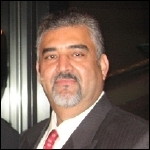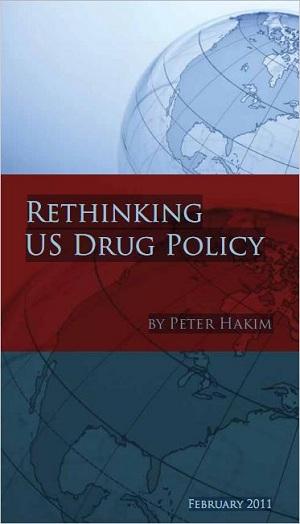Lost in Translation: Mostafa Soliman's trials and tribulations before and after the protests began, for importing hemp oil into Egypt border on the surreal. But there's nothing funny about the possible death sentence he's looking at.
California has a well-deserved reputation for being on the cutting edge of social change. What are the prospects for drug reform there now?
A pair of South Florida brothers have become the fourth and fifth people to be killed during drug law enforcement operations in the US this year.
This year's sixth drug law enforcement killing took place Friday afternoon in Charleston, West Virginia.
Two El Paso teenagers were among the victims of prohibition-related violence in Mexico this past week. The death toll since Calderon took office is now at more than 35,000.
A Wisconsin narc crosses the line, and cops in Houston and Philadelphia pay for getting too greedy.
DrugWarFacts.org is an in-depth compilation of key facts, stats and quotes on the full range of drug policy issues, excerpted from expert publications. The Chronicle is running a series of info items from DrugWarFacts.org, and we encourage you to check it out.
The Virginia legislature has taken a couple of giant steps toward banning fake pot. Bills have unanimously passed both the House and Senate and now need only to be reconciled before heading to the governor.
Pot decriminalization is moving in the Hawaii Senate, but not so much in the House.
Add the Inter-American Dialogue to the ever-growing list of drug war critics. The group has just issued a new report calling for a fundamental rethinking of US drug policy.
The Islamic Republic is resorting to the same old hard-line tactics as it confronts a new -- to Iran -- drug threat.
Events and quotes of note from this week's drug policy events of years past.
A US citizen jailed as a drug trafficker in Egypt in December after importing a shipment of non-drug hemp oil there was freed from jail late last month when mobs of protestors overran prisons across Cairo, but remains in legal limbo. Mostafa Soliman, who operates a company called Health Harvest, has so far been refused a new passport by the US Embassy in Cairo, which means he cannot leave the country. He faces a possible death penalty if convicted of drug trafficking.

Mostafa Soliman
According to the
Death Penalty Project of the
International Harm Reduction Association, Egypt is one of 32 countries that have laws mandating the death penalty for some drug offenses on the books. While Egypt is not among the leading drug offender executioner countries, such as Iran, China, Saudi Arabia, Vietnam, Singapore, and Malaysia, drug offenders do get executed there, the first one in 1989.
Soliman, 62, was born in Egypt and has retained Egyptian citizenship, but the dual citizen has resided in the US for the past 40 years. He had returned to Egypt to oversee the arrival of the hemp oil shipment.
When the shipment of bottled hemp oil arrived at Egyptian customs in December, authorities translated "hemp oil" as "hash oil," and that's when Soliman's life took a Kafkaesque turn. (Arabic does not have a distinct word for "hemp": any concoction from the cannabis plant, whether high THC or low THC, is simply called cannabis.
"Even the Egyptian drug enforcement people told me they knew it wasn't hash oil," Soliman said by phone from Cairo Friday night. "But they said they had to follow procedure."
That procedure resulted in a December 30 raid by drug enforcers on Soliman's storage facility and Soliman's arrest on drug trafficking charges. He was jailed pending trial, first at a neighborhood police station, and then, after the local police commander grew irritated by consular visits, transferred to one of Cairo's maximum security prisons.
"I was in an eight by eight cell that held as many as 30 people," said Soliman. "There were killers waiting to be hanged, thieves, rapists. That really upset me."
[

protests in Tahrir Square
]After Soliman had spent several weeks in prison, his Egyptian attorney managed to arrange bail, which would have allowed him to legally leave prison pending trial. But in a bizarre twist of fate, before he could be released, the current protests exploded in Cairo, and the city's prisons were besieged by mobs of uncertain provenance determined to free the prisoners. The prison guards fled the assault even as the prison caught on fire, leaving prisoners locked in their cells.
"I hid under the window," when the prison came under attack, Soliman said. "I was afraid of the Molotov Cocktails. Then the protestors came and broke the locks on the cells and freed us. It was all planned out. They knew all the military was being moved to the square for the protests and there would be little security at the prisons."
Soliman said he thought the Moslem Brotherhood was behind the attacks on the prisons, but like much else in the current crisis, the truth about that is obscure.
After fleeing the prison, Soliman went into hiding in Cairo, and contacted the US Embassy for help. He sought help in translating research reports on hemp and on obtaining a new passport -- Egyptian authorities had seized his, which meant he was effectively unable to leave the country.
But not much help was forthcoming, said both Soliman and members of the
Hemp Industries Association (HIA) and
Vote Hemp, leading industry advocacy groups in the US that have taken up Soliman's cause.
"I face a death penalty for selling drugs," Soliman said. "I was hoping for the embassy to help me translate some analyses and reports from the States to help me prove my case, but they don't want to do anything. I did it myself, and spent $3,000 to get it done."

organic hemp seed oil label, from Soliman's company, Health Harvest
Nor would the embassy issue him a new passport. "I went to the embassy and a representative came out and said he would try to help me," recalled Soliman. "After I waited outside for three hours, he came back out and said a photo would expedite the process. I came back with the photo the next day, and he took it and again I waited outside for two hours. Then he came out and said he could not help me," he said.
"I don't know what's going on with these people; the embassy has not been very helpful at all. They're not cooperating," he said.
"The US Embassy has not treated this US citizen with any respect," said Vote Hemp spokesman Adam Eidinger. "Our attorneys sent them a letter, and they acknowledged receipt of it and said they are looking into it, but the embassy has not been sympathetic."
Vote Hemp and the HIA launched an action alert Friday afternoon in a bid to raise the profile of the case. The alert calls on people to write Secretary of State Clinton and urge her to ensure that Soliman is issued a new passport.
"We hope the action alert will generate thousands of letters to the secretary of state," said Eidinger. "We want them to take up his cause and give him a passport. Right now, he's in legal limbo. If he goes to the airport in Cairo, he will be arrested. The only reason we can tell they won't give him a passport is these drug charges. This man's life is on the line. If he's convicted, they could kill him. Egypt does have the death penalty for drug smuggling," he emphasized.
Soliman's arrest and the US Embassy's failure to assist have aroused the ire of others in the US hemp industry. "The Egyptian authorities are just following the lead of their DEA counterparts in this ridiculous conflation of healthy, nutritious, non-drug hemp seed oil with the drug marijuana," said David Bronner, head of Dr. Bronner's Magic Soaps and a major player in the US hemp industry. "It's even more ridiculous when you consider that they are accusing someone of smuggling hash into Egypt in a hemp bottle. That is so clearly absurd."
"This is a tragic mistake that could be solved with a simple drug test. Mr. Soliman is being falsely accused of importing ‘hash oil’ when in fact it was healthy hemp food," said HIA executive director Eric Steenstra. "Our campaign to free Mostafa Soliman will hopefully jump-start action at the US State Department. We recognize that the unrest in Egypt will make it more difficult for US authorities to act, but this terrible mistake by Egyptian authorities was made well before the recent protests began and in many ways symbolizes the corruption the protestors are resisting," he added.
Until something happens, Soliman is stuck in Cairo and facing the dire prospect of being tried as a drug trafficker for importing a healthy food product. He said he hoped to be able to clear matters up, but that the ongoing political turmoil made his prospects unclear.
"If this situation gets worse, I'm not going to stick around," he said. "If it clears up, then maybe my attorney can clear up my legal situation. But I still need a passport."
back to top
[Editor's Note: This is the first in a series of reports on the prospects for drug reform in a handful of states where the chances of legalizing marijuana are the strongest. But these reports will also look at medical marijuana, harm reduction, and sentencing reform prospects. They are a work in progress and will be revised. Look for reports on Colorado, Oregon, and Washington in coming weeks.]

California, viewed from space
The West Coast is a different world when it comes to progress on drug policy reform. Three of the four states most likely to see strong pushes for marijuana legalization in the next couple of years are on the West Coast (the other being Colorado). And medical marijuana is a fact of life from San Diego to Seattle, even if many bruising battles remain, and is certain to be an area of contention in coming years.
But it's not just pot politics that makes the West Coast different. The region has also been a pioneer in sentencing reform and harm reduction practices, even if countervailing forces remain strong and both policy areas remain contested terrain.
And the fact that all three states are initiative and referendum states adds another dimension to the politics of drug reform. In all three states, the initiative process has been an important vehicle for drug reform, although it has also been used for anti-reform efforts, most notably with Oregon sentencing initiatives.
Will the West Coast continue to be the drug reform vanguard? Here, we look at the prospects for reform in four broad areas -- medical marijuana, marijuana legalization or decriminalization, drug sentencing reform, and the enactment of harm reduction practices -- and assess where the reform movement can most productively apply its energies. We also attempt to identify areas and issues around which larger coalitions can be formed to advance drug policy and criminal justice reform objectives.
We begin with California, the first state to legalize medical marijuana and that state where advocates last year came within a handful of percentage points of winning voter approval for pot legalization. California is the nation's most populous state and has long been at the cutting edge of social change, but now it is also faced with a monstrous $25 billion budget deficit. How social change and fiscal crisis interact in the realm of drug reform policy-making will be a key issue for advocates as they attempt to deepen existing drug reforms and introduce new ones.
Marijuana Legalization
Last year saw efforts to legalize pot both in Sacramento and at the ballot box in November. Rep. Tom Ammiano (D-San Francisco) made history when his legalization bill was approved by the Assembly Public Safety Committee, but that bill later died. Ammiano is back at it again this year, but getting a legalization bill through the legislature will be a tough fight.
The tax and regulate marijuana legalization initiative led by Oaksterdam's Richard Lee managed to put together an impressive coalition of labor, civil rights, and other groups in the run-up to the November election, but that wasn't enough to get the measure over the top. Proposition 19 scored 46.5% of the vote. Legalization advocates are already laying the groundwork for another initiative; several hundred people gathered at a sold-out
California NORML (CANORML) conference in Berkeley late last month in a bid to take the first steps toward consensus among the state's complex, variegated, and often fractious marijuana community.
While Prop 19 failed to win a majority, reformers see the coalition-building that took place around it as a basic building block toward eventual victory. For the first time, pot legalization enjoyed organized support from outside the marijuana community.
"Prop 19 has opened up everything and moved marijuana legalization into the mainstream of American politics, particularly in the Western states," said Steve Gutwillig, California state director for the
Drug Policy Alliance. "Its defeat was at most a speed bump, and the Prop 19 campaign process itself accelerated the marijuana reform movement. It created unprecedented mainstream media coverage, educated millions of voters, and forged a new coalition that is poised to be recreated and expanded on in California and other states in 2012," he said.
Winning a legalization vote in California means continuing to mobilize labor and civil rights groups, he said. And the stars are aligning.
"Organized labor has to be at the table of what is clearly a burgeoning industry with thousands of viable jobs from agriculture to retail. For mainstream civil rights organizations, the racial profiling that is at the center of marijuana enforcement is an issue that intersects with groups with whom they are naturally allied on other issues. We're seeing a confluence of economic and racial justice issues at a time when mainstream voters are expressing a fatigue with the drug war in general and a contempt for marijuana prohibition in particular," Gutwillig argued.
"The SEIU's endorsement of Prop 19 in California opened the door to a serious conversation with the service employee unions all across the country, said Gutwillig. "The SEIU also took a long look at the Washington initiative, but didn't think the numbers were there. But even that examination was significant. The SEIU thought the timing wasn't right last year, but all of this will be in play again and all of this represents real progress in coalition building. This conversation is taking place in a way that was unimaginable five years ago."
Gutwillig identified one more constituency reformers will be working to draw closer: the Democratic Party and its voters.
"The California Democratic Party took a neutral position, but a majority of county Democratic committees endorsed Prop 19," he noted. "That signals that there will be real conversations about what role marijuana legalization will play in terms of turnout among traditional Democratic voters."
Long-time CANORML head and veteran scene-watcher Dale Gieringer doesn't think winning outright marijuana legalization is going to be easy despite the coalition-building. Instead, he is talking about getting to the Promised Land through small steps and by broadening the existing medical marijuana system with its population of legally sanctioned adult users and providers.
Gieringer wants to down-grade minor marijuana distribution and cultivation offenses from felonies to misdemeanors, legalize private adult use, and establish a legally-regulated production system that includes manufacturing, processing, delivery, and legal sales to legally authorized users, namely anyone who has a medical marijuana recommendation.
"That would leave room for local governments to expand the universe of authorized users" without explicitly legalizing non-medicinal sale to adults, Gieringer said. "Taking on adult sales at this moment is premature, but we can write a law that opens the door to adult sales without explicitly doing it immediately."
Medical Marijuana
Using California's existing medical marijuana program as a segue to adult legalization, however, requires something the state still lacks: clarity about what is and is not allowed by Proposition 215 and the legislature's attempt to clarify it, SB 420. Some state prosecutors insist that no medical marijuana sales are legal, and the courts have yet to provide rigorous guidance. Cases have been and are being prosecuted in those counties, meaning that access to medical marijuana depends to a great extent on where one lives within California.
"Fixing the medical marijuana system has to be integral and a number one priority," said Gieringer. "We have to make changes to the medical marijuana system. The public is not happy with the current situation and would like something that is better regulated. A lot of operators feel the same way, but have differing opinions about what would be nice."
While a fix could come through the legislature, Gieringer was leery. "I can't see the legislature passing anything we would like," he said. "Given the level of support we have in Sacramento, we could probably get a bill to clearly allow medical marijuana sales, but it would also likely be loaded down with things we would find unacceptable, like 1000-foot provisions, no on-site smoking, no sale of edibles and the like," he predicted.
"They dickered around with it last year, but it was mainly about extracting money from everybody," Gieringer continued. "What's really needed is to clarify what's legal and what isn't."
Gieringer suggested that the people working on marijuana legalization initiatives include clarifying medical marijuana sales. "I think we could get something better through a vote of the people," he said. "I am hoping that medical marijuana reform will be part of the next legalization effort if there is one."
Such a strategy also has the potential of blunting opposition to a legalization initiative within the medical marijuana community. Some dispensary operators and medical marijuana patients were among the harshest critics of Prop 19.
Job protection for medical marijuana users is another area with the potential for coalition-building. State Sen. Mark Leno (D-San Francisco) has introduced a bill to prevent most employers from firing medical marijuana users who test positive for the drug. Perhaps unions, who, after all, represent workers, would be amenable to working on the issue.
Sentencing Reform
California's bloated prison system, with its insatiable, dollar-gobbling budgetary demands has seen some sentencing reform, most notably the passage by initiative of the "treatment not jail" Proposition 36. But the prisons remain full, and with no state money for the treatment end of Prop 36, it's only the law enforcement side of the equation that is fully functioning.
In announcing his
budget proposal last month, Gov. Jerry Brown (D) including diverting people convicted "nonviolent, non-serious, non-sex offenses, and without any previous convictions for such offenses" to county jails instead of the state prison system. That includes first-time drug offenders.
"Governor Brown set an important tone and made it clear that our expensive state prisons should be reserved for people convicted of serious offenses, not for everyone who's ever made a mistake," said Margaret Dooley-Sammuli, DPA deputy state director for Southern California. "California is expected to save $500 million a year by handling more petty offenses, including low-level drug possession, at the county level. We think the savings would be even greater if drug treatment were made more available in the community. Under the plan, counties would have that option."
An opportunity to save big bucks and reduce the yawning budget gap could appeal to fiscal conservatives, but in California, conservatives have a long tradition of using tough on crime politics to fill the prisons. Whether they could swallow a measure that to some degree empties them remains to be seen.
"The challenge is finding fiscally conservative Republicans who are willing to publicly challenge the drug war orthodoxy that has long been a mainstay of the Republican Party," said Gutwillig. "There are plenty of Republicans who are willing to say privately they know the mass arrests and incarceration of low-level drug offenders is not a good use of scarce resources, but they have a hard time breaking ranks with a GOP leadership that still needs inflexible tough on crime rhetoric to beat up on the substantial Democratic majorities in both houses of the legislature. It's one of their main tools to undermine the Democratic reform instinct.
Still, the continuing budget crisis may allow reformers to peel off a conservative or two, Gutwillig said. "The economics of the state are in such open-ended crisis that no one can deny the reality that we can no longer afford the blank check we perpetually give to law enforcement and the corrections system."
A 2008 sentencing reform initiative, the Nonviolent Offender Rehabilitation Act (NORA) would have deepened and vastly broadened the Prop 36 reforms, but was defeated thanks to last minute attacks by prison guards and politicians. The time could be approaching for another effort on that front, either in the legislature or via the initiative process.
Harm Reduction
Access to clean needles, preventing not only heroin, but, increasingly, prescription opioid overdose deaths, and opening a safe injection site in San Francisco are some of the issues facing California's harm reduction community. As in other reform areas, the perpetual budget crisis means if anything is going to happen, it better be inexpensive.
"We can't do anything this year that costs money, so we have to be about erasing some of the rules and barriers that exist," said Hilary McQuie, Western director of the
Harm Reduction Coalition. "Jerry Brown is pretty good on these issues, and we have a solidly Democratic government, so we should be able to get some of these things through as long as there is no fiscal impact."
Brown's predecessor, Gov. Arnold Schwarzenegger (R), wasn't so good on harm reduction issues. Last year, he failed to sign two bills that would have eased access to syringes. One expanded a pilot pharmacy syringe sales program statewide; the other expanded access to needle exchanges statewide.
"It looks like those bills will be reintroduced this year," said McQuie.
Overdose prevention continues to be a key harm reduction issue. Last year, a bill extending liability protection for the opioid antagonist naloxone to peer providers passed, but it only applies in a limited number of counties.
"We would like to see Naloxone made more easily available to people," said McQuie. "Maybe pharmacists could prescribe it along with opiates."
McQuie mentioned prescription opiates because that's where the action is now. And that means harm reductionists have to adapt their tactics to new clienteles. With prescription drug overdoses rising dramatically, programs aimed mainly at injection heroin users must now broaden their focus.
"Most of our overdose education happens through needle exchanges and other sites that reach injection drug users, but the trend in overdoses is toward prescription drugs," said McQuie. "We hope we can build coalitions with pharmacists, drug treatment people, and medical associations around peer intervention for overdose prevention among prescription drug users."
But coalition-building with drug and alcohol treatment providers means harm reductionists come up against abstinence-based advocates. "It is a long-term project for us to get them to recognize that they are serving people who are currently using rather than just addressing needs of people in treatment," McQuie sighed. "That will be really important for us. We need a bigger coalition in place."
And then there's the San Francisco safe injection site. At this point, it's little more than a gleam in the eye of harm reductionists, although the creation of such a site has been recommended first by the San Francisco HIV planning council and just last month by the mayor's Hepatitis C Task Force.
But given budgetary constraints, as well as morality-based opposition certain to emerge, if a safe injection site is going to happen, it's most likely to happen from the ground up. Vancouver, where drug users organized themselves and started their own safe injection site, could be a possible model, said McQuie.
"It's out on the horizon, and we're going to try," she said. "But nobody has the staff, resources, and willingness to risk their program sites and funding for this project. The way this could happen is if one of the agencies or drug user groups just starts doing it. It seems unlikely they would get prior permission."
Given the strain that existing harm reduction programs are under, maybe a new, expensive safe injection site program isn't the highest priority right now, McQuie. "But what this proposal does is open up a bigger conversation about harm reduction. Still, we need to set the stage for when the economy rebounds, and also to be prepared to step up and support whoever starts doing it."
California is fertile terrain for drug policy reform. It is also fiercely contested terrain. The coming years will tell whether the forces of reform can forge the alliances they need to emerge victorious on any number of fronts.
back to top
Editor's Note: This year, Drug War Chronicle is going to try to track every death directly attributable to drug law enforcement during the year. We can use your help. If you come across a news account of a killing related to drug law enforcement, please send us an email at [email protected].]
Two South Florida brothers became the fourth and fifth persons to be killed in drug law enforcement operations this year when they were shot to death by police the night of February 1 at an apartment complex in Miramar. Police told WVSN-TV they opened fire when brothers Herson and Hedson Hilaire struck an officer with their vehicle while attempting to flee a drug raid.

Herson Hilaire
It is not known whether the police were uniformed or undercover. Police did not say the brothers were armed.
"The officer was struck by the vehicle," explained Miramar Police spokesperson Tania Rues. "He went over the hood of the vehicle. He was transported to the hospital. He suffered non-life-threatening injuries."
A later report from
NBC Miami said that "the officer's injuries were minor and didn't require medical attention."
According to unnamed "sources" (read: the cops), four officers with the Safe Streets program observed "the suspected cocaine traffickers" inside a unit at the complex cutting several kilos of cocaine. The brothers grew spooked, ran to their car, and drove into one of the officers, prompting the other officers to open fire.
[Editor's Note: It is unclear why the brothers, who were allegedly involved in felonious activities, would do so in such a manner as to be visible from outside the apartment.]
The NBC Miami report said nothing about the brothers being inside a unit, only that officers "approached the Hilaire brothers, who were in a car outside the complex."
Police records showed that the driver, Herson Hilaire, 28, had been previously arrested on cocaine trafficking and distribution charges. Older brother Hedson apparently had no criminal record. He was in the front passenger seat.
The apartment unit did not belong to the Hilaires, but to an unnamed tenant who was not home at the time of the incident. That tenant was questioned by police and released.
The tenant told WSVN-TV News that the brothers were helping him move and that they were good people. "Two of the best people I know," he said. "Loyal, they're not violent people, they're not confrontational. They're real good people. Herson is an aeronautical engineer," he said. "He was down here on vacation. They were at my residence helping me move out, helping me clean up, so I can be out of there. There were no narcotics involved. This is the past. They were being rehabilitated."
Police have not released the amount of type of drugs found, but spokeswoman Rues said, "It was a narcotics investigation. Officers did view narcotics in their possession, and narcotics and paraphernalia was found at the home. I will say this: It was more than the amount that would appear to be for personal consumption."
The four officers involved in the shooting have not been named, but have been reassigned pending the outcome of a routine investigation into police-involved shooting.
back to top
Editor's Note: This year, Drug War Chronicle is going to try to track every death directly attributable to drug law enforcement during the year. We can use your help. If you come across a news account of a killing related to drug law enforcement, please send us an email at [email protected].]
This year's sixth drug law enforcement killing occurred Friday afternoon in Charleston, West Virginia, when officers from the Kanawha County Metro Drug Unit shot and killed a Detroit man after his car hit an officer as he attempted to flee a drug arrest. Police identified the dead man as Stiney Richards, 38.

Drug war takes a life in Charleston (Image via Wikimedia)
According to Charleston Police, undercover officers with the Metro Drug Unit made a large crack cocaine purchase from Richards, whom they said had a criminal record that included drug and weapons offenses. When they attempted to arrest Richards, he jumped in his car and attempted to flee, hitting one plainclothes officer as he did so. The officer was not seriously injured.
Other officers opened fire, or, as WSAZ-TV strangely put it, "fired back," mortally wounding Richards, who managed to drive a few blocks before crashing his car. Police have not said that Richards shot at them, or even that he was armed.
"Because the incident took place in Charleston our detectives are investigating," Lt. S.A. Cooper said. "The officers who actually discharged their weapons do not work for the Charleston Police Department but there were officers from numerous agencies at the scene."
Kanawha County Prosecutor Mark Plants will review the case after police file a report, but he was already hinting at what the outcome of his review will be. "This shooting is like any other shooting in Kanawha County -- I have to look at the evidence and make a determination whether that shooting was justified or not," Plants said. "But these are people who put their lives on the line every day, perfect strangers yet willing to sacrifice their lives. In today's age, violence against a police officer is not that uncommon."
The Metro Drug Unit is a federally funded drug task force that has been in existence since the 1980s. It includes officers from the Charleston, South Charleston, Dunbar, St. Albans, and Nitro police departments, as well as the Kanawha County Sheriff's Department and agents from the DEA.
The killing of Richards was the second violent incident for the Metro Drug Unit in little more than a week. On January 28,
a Charleston police detective was shot in the hand when an occupant of a house being raided on a drug search warrant opened fire, shooting through a closed door. Residents of the house had been the victims of a home invasion robbery days earlier.
back to top
by Bernd Debusmann, Jr.
Mexican drug trafficking organizations make billions each year smuggling drugs into the United States, profiting enormously from the prohibitionist drug policies of the US government. Since Mexican president Felipe Calderon took office in December 2006 and called the armed forces into the fight against the so-called cartels, prohibition-related violence has killed more than 35,000 people, including more than 15,000 last year. The increasing militarization of the drug war and the arrest of dozens of high-profile drug traffickers have failed to stem the flow of drugs -- or the violence -- whatsoever. The Merida initiative, which provides $1.4 billion over three years for the US to assist the Mexican government with training, equipment and intelligence, has so far failed to make a difference. Here are a few of the latest developments in Mexico's drug war:

No end in sight to Mexico's prohibition-related violence. (Image via Wikimedia)
In Nuevo Laredo,
the newly appointed police chief was killed in an ambush. Manuel Farfan Carriola, a former army officer, had been in office for 33 days. In 2005, Nuevo Laredo's police chief was assassinated after less than a day in office.
Friday, February 4
In Tamaulipas,
13 gunmen were killed during a series of battles with the army. Twelve gunmen were killed in two separate clashes near San Fernando and Valle Hermoso and the 13
th was killed after soldiers exchanged fire with a two gunmen in Nuevo Laredo. The other suspect was captured.
In Pharr, Texas,
13,314 pounds of marijuana were seized by ICE agents at a self storage unit. No arrests were made. Pharr is on the American side of the border with Reynosa, Tamaulipas.
Saturday, February 5
In Ciudad Juarez,
16 people were murdered on Saturday. In one incident,
two American citizens were among a group of three teenagers who were gunned down at a car dealership. The boys, aged 15 and 16, both were enrolled in El Paso high schools. The motive for the attack is unclear.
In Nuevo Leon,
the head of security of a local prison was found dead after having been kidnapped by a group of heavily armed men near his house the night before. Mr. Martinez Ramirez, 60, is the third employee of Monterey's Topo Chico prison to be murdered in recent months. A note with an unreleased message from an unspecified criminal organization was left along with the body.
Tuesday, February 8
In Zacatecas,
five people were found murdered execution-style on the side of a road. The victim's hands and feet were bound and each had been shot once through the head.
In Utah,
Undersecretary of the Army Joseph Westphal caused a stir by saying that Mexico faced a narco-insurgency. He later backed away from the statement after Mexican officials publicly objected.
In Reynosa, Tamaulipas,
soldiers rescued 44 kidnapped Guatemalan migrants who were being held in a house. Three Mexicans were also rescued and according to Mexican news sources, 102 kilos of cocaine were seized. No arrests were made. Drug trafficking organizations like the Zetas are known to kidnap migrants and give them the choice of working or being killed. In August, 72 migrants were shot dead in one of the biggest massacres of Mexico’s drug war.
Total Body Count for the Week: 237
Total Body Count for the Year: 878
Total Body Count for 2010: 15,273
Total Body Count for 2009: 9,600
Total Body Count for 2008 (approx.): 5,400
Total Body Count for 2007 (approx): 4,300
Total Body Count for Calderon’s drug war through 2010: 34,849
Total Body Count for Calderon’s drug war to date: 35,727
back to top
A Wisconsin narc crosses the line, and cops in Houston and Philadelphia pay for getting too greedy. Let's get to it:

Denise Markham
In Madison, Wisconsin,
a Madison Police officer has resigned in a negotiated settlement as she was being investigated for alleged misconduct. Denise Markham, a 22-year veteran of the department, was assigned to the Dane County Narcotics and Gang Task Force, but had been on paid leave since June 2009, when an investigation into her activities commenced. The investigators found no evidence of illegal conduct, but found that she violated departmental policies by filing inaccurate reports, conducting improper searches, conducting improper seizures of private property, improperly handling seized drugs, and engaging in "overbearing, oppressive or tyrannical conduct." In other words, illegal conduct.
In Philadelphia,
two former Philadelphia police officers pleaded guilty Monday to plotting to rip-off a suspected heroin dealer. Robert Snyder and James Venziale plotted with another former officer, Mark Williams, to stage a traffic stop as a pretext for stealing heroin from a supplier. Williams has pleaded not guilty. Venziale cooperated with prosecutors and faces a five year mandatory minimum sentence, while Snyder, who did not cooperate with prosecutors, faces a mandatory minimum 10 years on gun and drug charges. Sentencing is in May.
In Houston,
a former Harris County Sheriff's deputy pleaded guilty Monday to stopping drug dealers and ripping-off their loads. Richard Bryan Nutt Jr., 43, pleaded to one federal count of extortion after getting caught in a Houston police sting operation. While in uniform, Nutt stopped a vehicle supposedly carrying drugs, and one of his co-conspirators entered the vehicle and retrieved a package containing two pounds of fake cocaine. The sting was set up after Houston police received information that someone was ripping off drug couriers. Nutt is free on bond pending sentencing in June. He's looking at up to 20 years in federal prison.
back to top
DrugWarFacts.org, a publication of Common Sense for Drug Policy (CSDP), is an in-depth compilation of key facts, stats and quotes on the full range of drug policy issues, excerpted from expert publications on the subjects. The Chronicle is running a series of info items from DrugWarFacts.org, and we encourage you to check it out.
Did you know that approximately 30 countries allow farmers to grow hemp (but not the US)?
"Approximately 30 countries in Europe, Asia, and North America currently permit farmers to grow hemp, although most banned production for certain periods of time in the past. The United States is the only developed nation in which industrial hemp is not an established crop. Great Britain lifted its ban in 1993 and Germany followed suit in 1996. In order to help reestablish a hemp industry, the European Union administered a subsidy program in the 1990s for hemp fiber production.
In 1998, Canada authorized production for commercial purposes, following a three-year experimental period and a 50-year prohibition. As a condition of receiving a license to grow industrial hemp, Canadian farmers are required to register the GPS coordinates of their fields, use certified low-THC hemp seed, allow government testing of their crop for THC levels, and meet or beat a 10ppm standard for maximum allowable THC residue in hemp grain products. Agriculture Canada (the Canadian department of agriculture) estimates that more than 100 farmers nationwide are growing hemp, with the majority in central and western Canada."
Source: Rawson, Jean M., Congressional Research Service, "Hemp as an Agricultural Commodity" (Washington, DC: Library of Congress, January 5, 2005), p. CRS-3, http://www.fas.org/sgp/crs/RL32725.pdf(via the DrugWarFacts.org Hemp chapter).
Sign up for the DWF new facts RSS feed, or read last week's DWF Drug War Chronicle blurb here.
Common Sense for Drug Policy is a nonprofit 501(c)(3) organization dedicated to reforming drug policy and expanding harm reduction. CSDP disseminates factual information and comments on existing laws, policies and practices.

back to top
By a vote of 98-0, the Virginia House Monday passed its version of a bill, HB 1434, that would outlaw synthetic cannabinoid products. Three days earlier, the state Senate passed its version of the bill, SB 745, on a 37-0 vote.

Busy with bans in Richmond (image via Wikimedia)
The House bill adds synthetic cannabinoids to the state's list of controlled substances, but the Senate bill does not. The House bill also has stiffer penalties for violators. That means the two bills will have to be reconciled for the ban to move to the governor's desk.
Products containing synthetic cannabinoids are sold in convenience stores, corner gas stations, and head shops in states where they have not been outlawed, and are also available on the Internet. They are typically marketed as incense and are sold under a variety of names, including Spice and K2.
The products are billed as a legal marijuana substitute, but hospital emergency rooms and poison control centers have reported numerous calls from people agitated or paranoid after using them. Still, the symptoms do not appear to be life-threatening, and no overdose deaths have been reported.
The
DEA moved in November to take emergency action to institute an emergency federal ban on synthetic cannabinoids, but so far, that action has been blocked by legal action from retailers' associations.
Thirteen states have already banned synthetic cannabinoids. Similar actions are pending in a number of other state legislatures this year.
back to top
A bill that would decriminalize the possession of up to an ounce of marijuana by adults passed out of two state Senate committees Friday. The bill, SB 1460, must now pass one more committee vote before heading to the Senate floor.

Will the Aloha State be the next decrim state? (Image via Wikimedia)
The bill, as amended, makes possession of up to an ounce a civil violation punishable by a fine of up to $100. It also removes marijuana possession as a reason courts may require parolees and probationers to submit to drug treatment, and it clarifies that possession of less than an ounce in itself is not the basis for a possession with intent to distribute charge and that a being fined for possession does not constitute a prior offense for sentencing purposes.
Possession of less than an ounce of pot is currently a misdemeanor punishable by up to 30 days in jail and a $1,000 fine. It also leaves a permanent criminal record.
Marijuana law reform advocates said that pot smokers should not be jailed and clogging up the courts for a nonviolent offense.
"Given how common, how normalized marijuana use is in this country, this is counterproductive," said Pam Lichty, president of the Drug Policy Action Group. "Saddling young people particularly with criminal penalties affects their entire life."
But law enforcement predictably enough stood up to speak against the bill. It would send the wrong message, went the cops' all-too-familiar lament.
"We shouldn't be telling our youth that it's OK to smoke or to deal one ounce of marijuana, period," said Keith Kamita, chief of the narcotics enforcement division for the Hawaii Department of Public Safety.
The measure passed out of the Senate Health and Judiciary and Labor committees in a joint vote Friday and now goes before the Senate Ways and Means Committee. A similar bill in the House,
HB 544, is before the House Judiciary Committee. No hearing date has yet been set.
Small-time pot possession has been decriminalized in 14 states, the most recent being California, Massachusetts, and Nevada. Most of the other decrim states acted in the 1970s.
back to top
A prestigious Washington, DC-based center for hemispheric policy analysis and discussion, the
Inter-American Dialogue, is calling for a refashioning of US drug policy. It demands an end to "the silent tolerance of ineffective, socially harmful laws, institutions, and policies" and has some suggestions as to where to go next.
In a report authored by the Dialogue's Peter Hakim,
Rethinking US Drug Policy, the Dialogue said: "The available evidence suggests that in the past two decades, US anti-drug policies have done little to diminish the problems they were designed to address." The report proposed a number of initiatives the US government could undertake to set the stage for a thorough rethinking of US drug policy:
- Support recent Congressional initiatives to establish House and Senate commissions to review US anti-drug strategies and develop alternative approaches;
- Join with other nations to organize an inter-governmental task force on narcotics strategy that would review and appraise global drug policies;
- Revise outdated UN treaties that underpin the international narcotics regime;
- Expand data collection, analysis, and research on multiple aspects of drug problems and the policies and programs designed to address them; and
- Identify and scale up successful drug programs that promise to reduce drug addiction and the health risks to addicts, increase the prospects of rehabilitation, and decrease drug related crimes.
The Inter-American Dialogue is holding a public discussion of the report and its recommendations Thursday, 2/10/11 on Capitol Hill.
back to top
Already faced with one of the world's highest levels of opiate use, Iran is now confronting a new drug: methamphetamine. The Islamic Republic has responded with intensified law enforcement efforts and, last month, amended its drug law so that for the first time it now imposes harsh penalties for possessing, manufacturing, or trafficking synthetic drugs, including meth and other amphetamines.

Iran display, UN Commission on Narcotic Drugs, Vienna 2008
Under the amended Dangerous Drug Act, people caught with more than fifty grams (less than two ounces) of synthetic drugs could face a death sentence if convicted. Iran already imposes the death penalty for people caught in possession of more than five kilograms of opium or 30 grams of heroin.
For the synthetics, however,
it will take a second conviction to merit a sentence of either life in prison or death by hanging. First offenders will be fined and jailed.
Iran is already one of the world's most prolific drug offender executioners. Dozens go the gallows for drug offenses each year, and this year, Iran is on an especially blistering pace. At least
56 people were executed for drug offenses in January alone.
Iranian police have not been waiting for the new law to crack down. In a
statement to media late last month, anti-drug police said they had seized 129 meth labs and 1,151 kilos of meth since March. Hamid Rez Hossein-Abadi, the head of the anti-drug police, added that more than 20,000 people had been arrested for meth offenses in the same time period.
Most recently, authorities in Iran and Malaysia busted a trafficking ring that smuggled meth from labs in Malaysia to Iran.
Malaysian authorities reported that they had busted more Iranian meth traffickers last month than in all of last year.
back to top
February 14, 1929: St. Valentine's Day Massacre symbolizes the mob violence of the Prohibition era.
February 12, 1961: In the first televised challenge to marijuana prohibition, Beat poet Allen Ginsberg uses an appearance on the John Crosby show to argue for the harmlessness of marijuana. By the end of the program, Crosby and guests author Norman Mailer and anthropologist Ashley Montagu all joined Ginsberg in agreeing the current laws were too extreme.
February 11, 1982: Attorney General William French Smith grants an exemption sparing the CIA from a legal requirement to report on drug smuggling by agency assets. The exemption had been secretly engineered by CIA Director William J. Casey according to a letter placed into the Congressional Record by Rep. Maxine Waters (D-CA) on May 7, 1998, which establishes that Casey foresaw the legal dilemma which the CIA would encounter should federal law require it to report on illicit narcotics smuggling by its agents.
February 16, 1982: During a speech in Miami, Florida, George H. W. Bush promises to use sophisticated military aircraft to track the airplanes used by drug smugglers. By June, airborne surveillance time is running a mere 40 hours per month, not the 360 hours promised by Bush, prompting Rep. Glenn English to call hearings on the topic. By October, the General Accounting Office issues an opinion in which it finds "it is doubtful whether the [South Florida] task force can have any substantial long-term impact on drug availability."
February 11, 1988: The international heroin seizure record is set -- 2,816 pounds in Bangkok, Thailand.
February 14, 1995: The US House of Representatives approves several drug-related bills, including H.R. 728, a bill that replaces the police ($8.8 billion), prevention ($4 billion), and drug courts ($1 billion) provisions of the 1994 Crime Act with a $10 billion block grant program.
February 14, 1996: Fairfax Police Chief Jim Anderson becomes one of the latest officials to speak out in favor of California's medical marijuana initiative when he says, "I believe there is adequate unbiased and scientific evidence that marijuana does have medicinal benefit."
February 10, 1998: The United Kingdom House of Lords announces an investigation into the recreational and medical use of marijuana to be conducted by the Lords Select Committee. Announcement of the inquiry follows a campaign by the UK's Independent to decriminalize marijuana, a report from the British Medical Association urging Ministers to consider allowing the medical use of cannabinoids, and a plea from Lord Chief Justice Lord Bingham of Cornhill, who says marijuana decriminalization deserves "detached, objective, [and] independent consideration."
February 11, 1999: Researchers in Boston, Massachusetts, announce they found no link between marijuana use by pregnant mothers and miscarriages. The study does document a strong link between tobacco consumption and miscarriages, and also shows an increased risk of miscarriage by mothers who use cocaine.
February 11, 2001: President Jorge Battle of Uruguay becomes the first head of state in Latin America to call for drug legalization.
February 12, 2002: The same day that President George W. Bush issues his National Drug Control Strategy, DEA agents raid the Harm Reduction Center, a medical marijuana club in San Francisco.
February 15, 2002: The ImpacTeen Illicit Drug Team releases a report entitled "Illicit Drug Policies: Selected Laws from the 50 States." The report says that state statutory drug laws vary significantly across the United States, contradicting a commonly-held assumption that state drug policies follow federal drug policy. For instance, depending on the state, a first time offender may be subject to anywhere from one year to lifetime imprisonment and $5,000 to $1 million in fines for the sale of one ecstasy pill. The report also shows that, as of January 1, 2000, 24 states and the District of Columbia enacted legislation allowing the use of marijuana for medical purposes, despite the federal government's objections.
February 10, 2003: South Dakota's HB 1153 passes the state's House of Representatives. The bill revises the current penalties for marijuana distribution to include "intent to distribute."
February 14, 2004: The Daytona Beach News Journal reports that Volusia County sheriff's investigators seized bricks of marijuana during several drug busts that were, in fact, bricks they had already seized before. As it turned out, half a million dollars' worth of drugs was stolen from their evidence compound by a former evidence manager. How many times it may have happened prior wasn't known.
back to top












